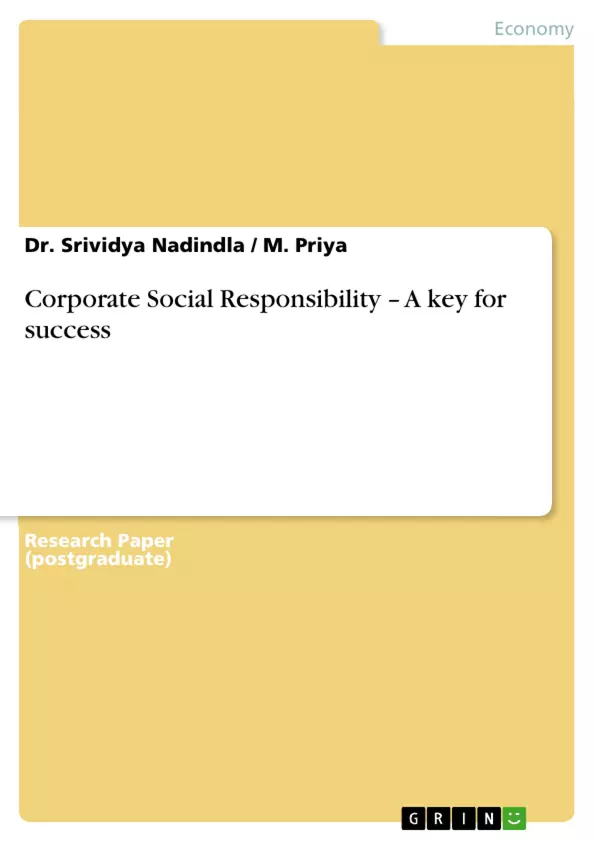Corporate Social Responsibility (CSR) is becoming most popular and a must for many companies. This CSR means not only doing some community service or social service or maintaining business ethics etc. Apart from the social good brought about by it, CSR also makes business sense. IT companies in India are increasingly sending out this message and a growing number of companies and institutions in India are seeking to link their own growth and survival to the social cause that they are promoting.
CSR is generally understood to be the way in which a company achieves balance or integration of economic, environmental and social imperatives while at the same time addressing shareholder and stakeholder expectations. It helps make inroads into areas where a company might otherwise not have had a presence, building a talent tool, capacity building in communities, being perceived as a socially responsible corporate among employees, which adds to a sense of pride for an organisation.
Today not only the IT industry fuelling India’s growth, it is also acknowledged to be one of the front runners in CSR initiatives. Pointing out some potential areas where a CSR can play a vital role in India, Vikas Goswami, CSR lead, micro soft India says, “We have understood that certain issues like providing IT training, skills, techniques and tools to create social and economic opportunities can transform communities and help people realize their potential.”
To engage in CSR activities is important to any organisation irrespective of origin and category but then the importance of such engagements becomes even more critical when in new industry booms in a country and with it the society gets introduced to new opportunities as well as issues.Emphasing the growing importance of globalization, CSR can also be looked as a source of competitive advantage as it aligns the company’s mission and values with initiatives that delve into civic engagement. Companies wanting to reach the bottom of the pyramid have to innovate and CSR no longer gets labeled as ‘do good’ but more as a core business opportunity.
A sample of 100 is considered with convenient sampling considering various sectors of the industry. The responses were tabulated and analyzed with some statistical tools to arrive conclusions and recommendations. Apart from the various types of the companies, the size of the company (in turnover) is also considered for research.
Inhaltsverzeichnis (Table of Contents)
- Objectives of the Study
- Scope of the Study
- Limitations of the Study
- Research Methodology
- Data Analysis
Zielsetzung und Themenschwerpunkte (Objectives and Key Themes)
This study focuses on corporate social responsibility (CSR) practices in India, specifically within the IT, IT-enabled services (ITSS), FMCG, and manufacturing sectors. The research aims to understand the reasons behind companies adopting CSR, the various aspects considered within CSR, and its impact on businesses. The study also investigates how company size and industry type influence CSR initiatives. Key themes of the study include:- Reasons for companies adopting CSR
- Various aspects considered under CSR
- Impact of CSR on companies
- Influence of company size on CSR initiatives
- Influence of industry type on CSR initiatives
Zusammenfassung der Kapitel (Chapter Summaries)
Objectives of the Study
This section outlines the main objectives of the study, which are:- To study the reasons why companies are going for CSR.
- To study various aspects they are considering under CSR.
- To study its impact on the companies.
- To study how the size of the company effects CSR.
- To study how the type of the company effects the CSR.
Scope of the Study
This section discusses the relevance of the study for companies engaged in CSR, future researchers, and addressing any potential negative impacts of CSR.Limitations of the Study
This section outlines limitations of the study, including:- Data being based solely on respondent's personal views and opinions.
- Potential inaccuracies in the data.
- Time constraints.
- Limited scope of the research.
- Focus on a limited number of industries.
Research Methodology
This section details the research methodology, including:- Sample size of 100.
- Target industries: ITSS, IT, FMCG, and Manufacturing.
- Analysis tools: Two-way ANOVA.
- Null hypotheses regarding the variance of company types, sizes, and reasons for engaging in CSR, impacts of CSR, aspects considered under CSR, benefits of CSR, and issues considered under CSR.
Data Analysis
This section presents an analysis of the data using a table and ANOVA summary. The section discusses the null hypotheses and calculated values, drawing conclusions based on the results.Schlüsselwörter (Keywords)
Corporate Social Responsibility (CSR), IT, IT-enabled services (ITSS), FMCG, Manufacturing, India, company size, industry type, impact, reasons for adoption, aspects considered, benefits, issues.Frequently Asked Questions
What is Corporate Social Responsibility (CSR)?
CSR is the way a company balances economic, environmental, and social imperatives while addressing the expectations of shareholders and stakeholders. It goes beyond community service to include business ethics and sustainable growth.
Which sectors in India are front runners in CSR?
The IT industry and IT-enabled services (ITSS) are major leaders, along with the FMCG (Fast-Moving Consumer Goods) and manufacturing sectors.
Why do companies adopt CSR practices?
Companies adopt CSR to build talent tools, enhance community capacity, gain competitive advantages through globalization, and align their mission with civic engagement. It is increasingly seen as a core business opportunity rather than just 'doing good'.
How does company size affect CSR initiatives?
The study analyzes how turnover and organizational size influence the scale and focus of CSR activities, suggesting that larger companies often have more structured and diverse initiatives.
What are the benefits of CSR for employees?
Being perceived as a socially responsible corporate adds to a sense of pride among employees and helps in attracting and retaining talent.
- Arbeit zitieren
- Dr. Srividya Nadindla (Autor:in), MBA, (Ph.D) M. Priya (Autor:in), 2009, Corporate Social Responsibility – A key for success, München, GRIN Verlag, https://www.grin.com/document/183861



